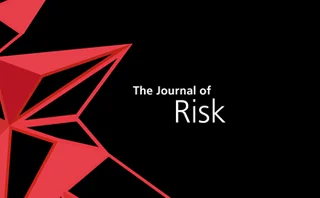Valuation adjustments (XVAs)
WHAT IS THIS? The XVAs are a family of adjustments that can be made to the price of a derivatives trade, reflecting counterparty risk (CVA), own-default risk (DVA), funding (FVA), capital (KVA) and margin (MVA). Their theoretical roots and practical implementation are still debated, but pragmatism also matters: banks that ignore XVAs are at risk of mispricing a trade; banks that include them are at risk of never winning a trade.
Model risk in the transition to risk-free rates
Transition is an opportunity to reduce multi-rate complexities, say Bakkar and Brigo
Rethinking XVA sensitivities – Making them universally achievable
Content provided by IBM
EU banks’ CVA capital to triple if exemptions axed
Seven banks would incur 200bp-plus hit to capital if long-standing waivers were repealed, says EBA
Top UK banks slash CVA capital charges by £680 million
Hedging, market movements, and cuts to exposures behind reductions
Podcast: Fries on Monte Carlo, Greeks and the future of AAD
Research on AAD is not complete until it becomes easier to implement, says quant
Brexit: banks take the ‘no’ out of novations
Swaps clauses stop end-users blocking counterparty switch, making it easier to move trades to EU affiliates
XVA: back to CVA?
Fundamental questions on CVA remain unanswered, writes mathematical finance head
Podcast: Mercurio on Libor, fraud and writing models on a plane
Post-Libor environment and financial crime detection to drive future research, says top quant
Time to move on from risk-neutral valuation?
Risk-neutral valuation could be replaced by models with a subjectivity element, writes mathematical finance head
Cloud set to replace in-house tech for banks
‘No other way’ to meet demands of FRTB, XVA and other changes, claim proponents
Asia Risk Congress 2017: The new XVA challenge
Video interview: Fabio Mercurio, Bloomberg
Mifid costs data leaves swaps users in the dark
Dealer charges can’t be compared, critics complain; banks already bracing for review
Reducing noise is as important as radical change
Quants study ways to reduce noise in XVA Greeks calculations
Pathwise XVA Greeks for early-exercise products
The calculation of XVA Greeks for portfolios with early-exercise products is discussed
CVA dismay: final Basel rules disappoint dealers
Minor tweaks don’t make up for removal of internal modelling, say banks
Quant analyst Antonov to swap Numerix for Standard Chartered
New role in London only second for Numerix veteran
Evolutionary algos for optimising MVA
Alexei Kondratyev and George Giorgidze apply two evolutionary algos to MVA optimisation
Degree of influence, 2017: Quants dissect initial margin
Initial margin, optimal execution and applications of machine learning were the hottest topics of 2017
CVA pay day: calculation arbitrage boosts bank profits
Lack of convergence allows some banks to benefit from an arbitrage between booking and pricing the adjustment
A model for the valuation of assets with liquidity risk
This paper describes a model for the valuation of assets on a bank balance sheet with liquidity risk. It applies the model to single cashflows, loans, bonds and derivatives. In addition, the calibration to London Interbank Offered Rate basis spreads is…
XVA quant Kenyon leaves Lloyds for MUFG
Kenyon jumps ship for similar role in XVA quant modelling
Capital savings from new IM regime elude dealers
Slow model development and approval processes mean banks yet to see benefits expected under margin rules
Banks say Europe’s CVA proxy-spread plans lack flexibility
Dealers welcome EBA proposals but say limited number of eligible counterparties means few benefits























